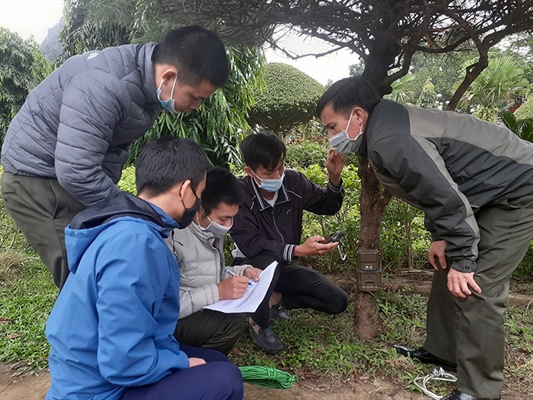November 28, 2025 | 04:49 GMT +7
November 28, 2025 | 04:49 GMT +7
Hotline: 0913.378.918
November 28, 2025 | 04:49 GMT +7
Hotline: 0913.378.918

The trainees were introduced by experts to the techniques of installing camera traps. Photo: TH.
Upon implementing the 2021 plan of the Constituent of Biodiversity Conservation under the USAID Sustainable Forest Management and Biodiversity Conservation Project (VFBC for short), Phong Nha - Ke Bang National Park (PNKBNP) Management Board, in collaboration with Quang Binh VFBC Project Management Board and Fauna & Flora International (FFI), organized a training course on biodiversity surveying for twenty-one PNKBNP technical staff and twenty-six members of PNKBNP Forest Protection Unit (FPU) along with FFI experts and technical staff.
The training course focuses on camera traps and threats investigation in Phong Nha - Ke Bang National Park. At the training course, the trainees were introduced by experts from FFI and Leibniz Institute for Zoo and Wildlife Research (IZW) to camera trap and the Spatial Monitoring and Reporting Tool (SMART).
The contents include: techniques for installing camera traps and collecting data on survey routes for main members of the survey group; guidance for trainees on the steps to collect data on survey routes for the community groups near PNKBNP that support the survey groups; brief introduction on the Standard Operating Procedure (SOP) for camera trap installation and camera trap data collection; data update from survey teams onto the SMART Desktop database; and installation of SMART mobile app on smartphones. The survey teams also opened discussions to assign specific responsibilities to each member.
Through the training course, the participants proficiently used smartphone applications to collect camera trap data, contributing to the survey of biodiversity and threats in Phong Nha - Ke Bang National Park.
According to Mr. Pham Hong Thai, Director of Phong Nha - Ke Bang National Park, the training course will help participants when participating in the field survey to firmly grasp the technical requirements and fully practice the steps of installing photo traps in accordance with the SOP. They will also learn to use the SMART mobile app to collect camera trap data on survey routes. By the end of the training the trainees should be able to clearly understand the field plan of the group and clearly assign responsibilities to each member of the survey team. They will also plan to coordinate the organization of logistics and daily logistics for the survey team.
All the techniques given in the training course will help participants effectively perform the functions and tasks assigned to the survey of biodiversity and threats in Phong Nha - Ke Bang National Park.
According to Quang Binh Department of Agriculture and Rural Development (DARD), Quang Binh VFBC Project utilizes capital from non-refundable aid from the USD 2 million fund from the United States Agency for International Development (USAID). The provincial budget's reciprocal capital is VND 5,141 million VND. The project implementation period is 6 years (2021 - 2026).
Quang Binh VFBC Project Management Board is responsible for helping the povincial People's Committee and the DARD by acting as the focal point for general coordination, management and implementation of the project in accordance with the objectives, progress, quality and human resources stated in the approved project documents.
The Management Board must comply with the provisions of the Sponsor (USAID) and the laws of Vietnam, and may use the seal of the Department of Forest Protection and open an account to initiate operation.
The main office is at the headquarters of Quang Binh Department of Forest Protection.
Translated by Khanh Linh

(VAN) According to Mr. Vo Minh Thanh, Director of the Tay Ninh Department of Agriculture and Environment, Resolution 57 has created a new development pathway for the locality, shifting from traditional toward modern agriculture.
/2025/11/26/4909-2-154329_878.jpg)
(VAN) Pearl grouper farming in HDPE cages not only delivers economic efficiency but also contributes to protecting the environment, creating jobs, and promoting marine-based experiential tourism.

(VAN) The model of making a living under the forest canopy through the agroforestry system in Van Son commune, Bac Ninh province, is expected to generate an annual income of approximately VND 30 million/ha.

(VAN) Many enterprises in Can Tho are harnessing natural energy and reducing greenhouse gas emissions in their production processes, thereby contributing to the promotion of a sustainable green transition.
/2025/11/24/3536-2-112800_176.jpg)
(VAN) Dong Nai now has tens of thousands of hectares of forests certified for sustainable management, and this area will continue to be expanded in the coming period.

(VAN) Vinh Ha hamlet (Dai Xuyen commune, Hanoi) is shifting away from small-scale farming as households adopt bioscurity into their breeder chicken models.

(VAN) Heavy rains make aquatic species more vulnerable to disease. Proactive water management and high-tech systems help farmers prevent outbreaks and protect yields.